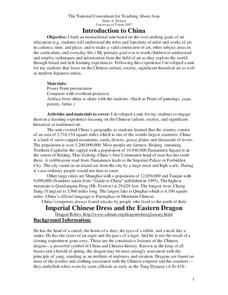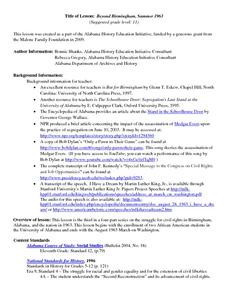Talking with Trees
What is Responsibility?
Encourage responsible behavior with a worksheet that challenges scholars to read four scenarios, identify the level of responsibility, and brainstorm consequences of the actions taken.
US Holocaust Museum
Life in Shadows: Hidden Children and the Holocaust
Hiding in the filth of a sewer, as a child, to avoid capture by Nazi soldiers—sounds scary! Scholars investigate the youngest victims of the Holocaust, the children. They research video clips and written sources from the Holocaust...
Curated OER
Mexico: Culture, Language, and History
Study the culture, language, and history of Mexico in this collection of lessons. Create maps of Mexico's geography, study Spanish language phrases, and create a fiesta, along with a Mexican Marketplace scene.
Curated OER
Issues of Gender
High schoolers study the issue of gender. Here, they are invited to view works of art, and read pieces of literature through history to show how the issue of gender has evolved over time. The works of Robert Harris are used extensively...
Curated OER
The Constitutional Convention: Four Founding Fathers You May Never Have Met
Students study the biographies of Ellsworth, Hamilton, Paterson, and Randolph. They study roles of these men during the Constitutional Convention.
Deliberating in a Democracy
Free and Independent Press
Young scholars determine how free press principles can be compromised. For this global studies activity, students read an article titled "Free and Independent Press." Young scholars respond to discussion questions regarding the article.
Curated OER
Western Civilizations, Chapter 5: Roman Civilization
Investigate Ancient Rome with this comprehensive online western civilizations website. While designed for use alongside the Western Civilizations textbook, the tools on this site can be used to emphasize any study. A chapter quiz...
Curated OER
Western Civilizations, Chapter 27: The Cold War: Global Politics, Economic Recovery, and Cultural Change
Keep your scholars organized using this study plan and progress report tool, one of many great learning strategies featured in this online western civilizations resource! Although designed for use alongside the Western Civilizations...
Pace University
American Revolution
Young historians get hooked into a unit study of the American Revolution with a simulation that lets them experience some of the outrage colonists felt about unfair taxes. Class members demonstrate what they have learned in the study by...
US House of Representatives
Objects in Time
Artifacts can be used to study people and events of the past. That's the takeaway from the fifth lesson in a unit study of African Americans who served in Congress. Groups select an artifact associated with a Black Congress Member from...
Curated OER
Life in the Floating World: Ukiyo-e Prints And the Rise of the Merchant Class in Edo Period Japan
Learners examine famous woodblock prints of artists such as Hiroshige and Hokusai as primary documents to help them gain insight on Japanese history. They relate the woodblock images to the social hierarchy of the period.
Curated OER
Mesopotamian Gods: Handout
Ancient religion was often times closely linked to social structure and government. Hand out a handy guide that describes 12 major gods and goddesses from ancient Mesopotamia. They are each connected to a location, symbol, and force of...
Curated OER
Introduction to China
Compare and contrast the distinctive characteristics of art forms from various cultural, historical, and social contexts, and describe how the same subject matter is represented differently in works of art across cultures and time...
Curated OER
Amish Quilters
Students research information about the Amish way of life and discuss how quilting is a necessity as well as a way for women to socialize within the Amish community. They create a diorama showing scenes related to quilting.
Curated OER
Immigration Debates in the Era of "Open Gates"
Young social historians examine immigration debates of the early 20th century through primary sources, such as political cartoons. They analyze the material, discuss their findings, and complete a critical thinking worksheet. All...
Curated OER
Podcast Interviews
Pairs of children work together in order to create an interview, conduct the interview, create a podcast for the interview, add pictures, then import the finished product to itunes. This multi-media lesson should go over quite well, as...
Curated OER
The Rule of Suleiman
Using two different documents, the class will show what they know about the laws of Suleiman. They determine Suleiman's religion based on his justice system. Then, they complete 4 tasks related to the structure of the social class system.
Alabama Department of Archives and History
Beyond Birmingham, Summer 1963
The assassination of Medgar Evers. The integration of the University of Alabama. The March on Washington. The "I Have a Dream" speech. Created by the Alabama History Education Initiative, this resource examines how the events that...
Alabama Department of Archives and History
Montgomery Bus Boycott: We Would Rather Walk!
Have historians use primary sources to learn about the circumstances and implementation of the Montgomery Bus Boycott, and think about the issue of boycotts as a means of effecting social change. Wrap it up with a letter to the editor...
Peace Corps
Defining Culture
How has culture shaped you? Middle and high schoolers examine different aspects of one's culture, including religious beliefs, social customs, and family traditions, and discuss the ways that their personalities have been formed by these...
NPR
Progressive Era Lesson Plan
The women working for equal rights in the early 20th century weren't a part of one large group; rather, they were members of dozens of small groups focused on social reform. Explore the ways groups in the Progressive Era like National...
US Institute of Peace
Perspectives on Peace
Is peace simply the absence of war, or is there more to the story? Young social scientists define peace in the second installment of a 15-part series. Groups work together to explore cultural concepts of peace and the peacemaking process...
US Institute of Peace
Maintaining Trusting Relationships
What role does trust play in diffusing a tense situation? Young social scientists explore trust on a personal and global level during a lesson on peace and conflict. After participating in a trust sit, participants work in groups to...
iCivics
Step 2: Find What You Need
Have you ever searched for something on the web only to get 50,000 results? Scholars analyze ways to break down an inquiry to get specific results. The second installment of a 10-part County Solutions - High School series researches...
Other popular searches
- Elementary Social Studies
- Middle School Social Studies
- Social Studies Lesson Plans
- Social Studies Lessons
- Social Studies Activities
- Esl Social Studies
- Social Studies Community
- Social Studies Art
- Social Studies Plan
- Social Studies Concepts
- Social Studies Economics
- Social Studies Map Skills

























